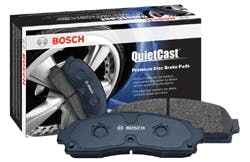In response to legislation requiring the reduction of copper in brake friction formulations, Bosch now offers copper-free material in its premium-grade QuietCast™ as well as its other lines of braking products. Furthermore, Bosch has developed a proprietary copper-free ceramic friction formulation that incorporates renewable materials to make its product even more environmentally-friendly.
“Our new copper-free material was developed over several years and has undergone various endurance tests,” said Robert Backode, Director of Product Management, Bosch Brake Components LLC. “Much like the copper-free alloy used to replace copper in the aerospace industry, this material too, has proven to be successful in automotive use, ensuring high strength and light weight. Test data of the new copper-free material confirms improved performance over copper-based materials.”
The automotive industry’s shift to low-copper content in braking products is a result of legislation passed in the states of California and Washington in 2010 that requires reduction in the use of copper to below five percent by 2021 (low copper) and less than .5 percent by 2025 (no copper). This legislation is based on the grounds that each time a motorist applies the brakes, a bit of copper and other metals get deposited on the road; and when it rains, those metals are washed into nearby streams and rivers – eventually harming aquatic life. Similar legislation has been introduced in Rhode Island, Oregon and New York.
The changeover to copper-free brake pads is currently in process at Bosch, with a gradual rollout of more and more copper-free products. In fact, many of the Bosch semi-metallic formulas, as well as the new ceramic formulation, already meet the 2025 no copper requirement so Bosch is well on its way to having its entire braking portfolio be compliant with the 2025 guideline years before it’s required.
To clearly indicate the level of copper in its QuietCast Brake Pads, Bosch is rolling out updated packaging beginning Jan. 1, 2015 that will include the industry standard LeafMark. The LeafMark is comprised of a three-leaf cluster with one, two, or all three leaves filled in to indicate the level of legislative compliance:
· One leaf: Level A – limits levels of asbestos, cadmium, chromium, lead and mercury
· Two leaves: Level B – includes all the requirements of Level A and copper levels must be less than 5 percent by weight
· Three leaves: Level N – includes all the requirements of Level A and copper levels must be less than 0.5 percent by weight
Bosch QuietCast Disc Brake Pads are engineered to match braking performance and efficiency precisely to the needs of different types and sizes of vehicles.
“We carefully select friction formulations to provide the blend of materials best suited to each vehicle and those that assure quiet, reliable, and long-lived braking on all types of vehicles, from subcompacts to large SUVs,” stated Backode.
“Further,” he added, “dedicated engineers source and rigorously test the materials and formulations to ensure that the final product meets the highest quality standards.” Bosch provides full coverage for Domestic, Asian and European cars, vans and SUVs with one out of every three vehicles on the road today using Bosch braking content.
From the application for its first brake system design patent in 1936, to Anti-lock Braking technology and Electronic Stability Control, Bosch has a long history of leading the industry with groundbreaking technologies.
“The introduction of copper-free brake pads that use renewable materials fits right in with this history and our aim is to continue to lead the industry with products that are both innovative and environmentally friendly,” Backode said.
For more information on Bosch braking components, please visit http://www.boschautoparts.com/brakes
Subscribe to Motor Age and receive articles like this every month…absolutely free. Click here


